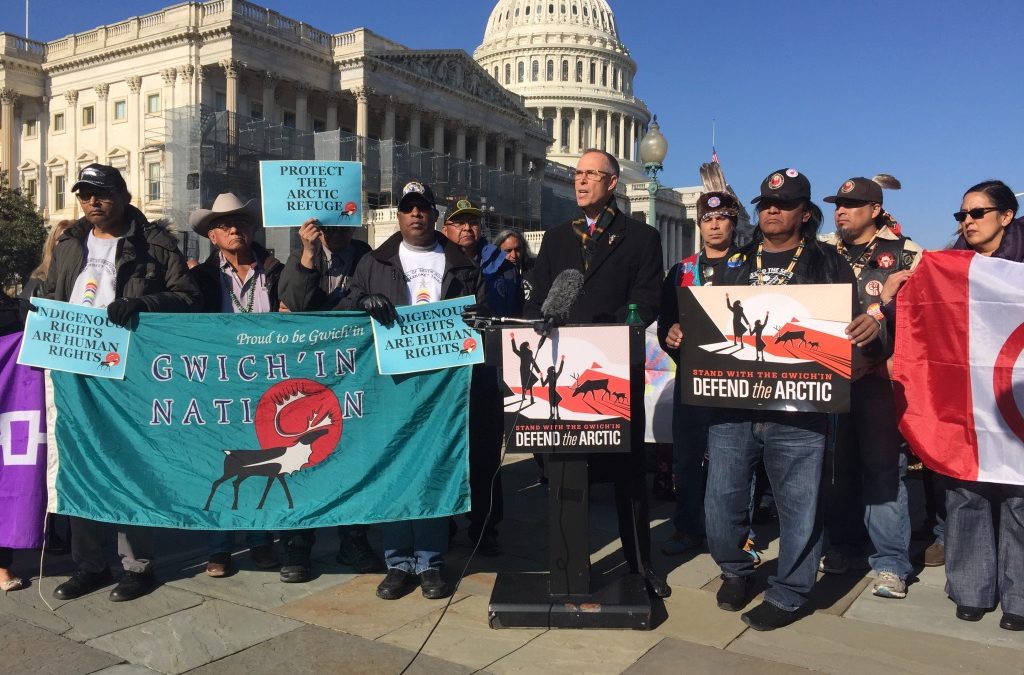WASHINGTON – Standing outside the Capitol, leaders of an Alaskan tribe said Tuesday they are “fighting for our way of life” that is threatened by new planned drilling in the Coastal Plain of the Arctic National Wildlife Refuge and pleaded with Democrats to stop it.
Incoming House Majority Leader Steny Hoyer told the Gwich’in tribe, “You are not alone. Now that Democrats control the House… we will have a seat at the negotiating table, which means you will have a seat at the negotiating table.”
Republicans inserted a provision into the 2017 tax overhaul bill that mandated oil and gas leasing, development and production on the Coastal Plain of ANWR. The area includes the calving grounds for the Porcupine caribou herd, which is vital to the food security of the Gwich’in.
“Our way of life matters,” Bernadette Demientieff said at an outdoor rally in freezing weather. “We shouldn’t have to be fighting for our way of life in 2018, almost 2019.” Demientieff is the executive director of the Gwich’in Steering Committee. She is a resident of Fort Yukon, which is called Gwichyaa Zhee in her native tongue.
About three dozen members of indigenous tribes came from all over the United States to support the Gwich’in. Some wore traditional clothing. Others wore down coats, baseball caps and running shoes. They were united by their resolve to preserve their land and water for future generations throughout North and South America. It is a theme that is familiar from the protests against the Keystone XL and Dakota Access pipelines.
ANWR was first protected in 1960 by the Eisenhower administration and was doubled in size in 1980 by the Carter administration. However, the 1.5 million acre Coastal Plain was not part of the wilderness designation, leaving it vulnerable to development.
According to Demientieff, the calving grounds are a sacred place and the tribe is “forbidden to set foot in it.”
In May, Reps. Jared Huffman, D-Calif., and Raul Grijalva, D-Ariz., introduced a bill to stop drilling on the Coastal Plain. Hoyer promised to introduce legislation to permanently protect the plain as a wilderness.
Huffman wrote a letter to Interior Secretary Ryan Zinke in June to protest the Trump administration’s intention to expedite the planning process that takes place before leasing. “The indigenous Gwich’in people have relied on the caribou for millennia and consider the Coastal Plain ‘the sacred place where life begins’ because of its importance to the caribou. To the Gwich’in, protecting the caribou means protecting their culture, their spirituality, their food security and their human rights.”
Rep. Ruben Gallego, D-Ariz., incoming chairman of the House Native American affairs committee, told the crowd that Republicans have been trying to “get their hands” on ANWR for decades. “But the extent to which this administration is willing to go is sickening,” he said. “Worse, it is something that is unnecessary. There is an oil glut in the world right now. We need to move to renewable energies and get off the addiction to carbon energy. And we should not be feeding our addiction on the backs of our native brothers and sisters.”
Demientieff said her tribal members came to Washington because the all-Republican Alaska delegation, Rep. Don Young and Sens. Lisa Murkowski and Dan Sullivan, are proponents of drilling in ANWR.
“I have to go to other representatives because mine won’t listen,” she said.
According to a spokesman in Sullivan’s office, 71 percent of Alaska residents favor drilling.
Demientieff said half the population of the state lives in Anchorage far from the drilling and they will not be impacted by it. Furthermore, there is no sales tax in Alaska and residents receive a dividend from oil revenues, which makes most pro-development.
Even the village of Kaktovik, located on an island in the Beaufort Sea on the Coastal Plain, is sharply divided on protection versus revenue. Matthew Rexford, president of the Kaktovik Iñupiat Corporation, testified at a congressional hearing in favor of drilling prior to passage of the tax bill.
“Several people from Kaktovik do testify in favor of oil,” wrote Kaktovik resident Robert Thompson, a subsistence hunter, in an editorial in the Anchorage Daily News. “However, these people do not represent the city government, and they are closely tied to oil companies.”

